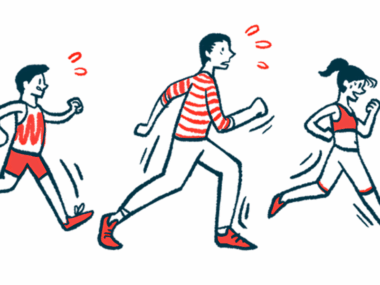Remote therapy program found to ease depression for MS patients
Such virtual programs may help to overcome treatment barriers: Study
Written by |

A cognitive behavioral therapy (CBT) program delivered virtually — using self-paced remote modules — significantly eased depressive symptoms and improved life quality in multiple sclerosis (MS) patients with depression, according to new research.
A Phase 3 trial testing the remote program had aimed to determine if an internet-delivered platform could help provide better access to cognitive behavioral therapy for people with MS and depression. Its findings showed a significant drop in symptoms of depression among patients — with one researcher calling the results “remarkable.”
“This remote-access, scalable intervention increases the therapeutic options in this patient group and could help to overcome treatment barriers,” the team wrote.
The study, “Internet-delivered cognitive behavioural therapy programme to reduce depressive symptoms in patients with multiple sclerosis: a multicentre, randomised, controlled, phase 3 trial,” was published in The Lancet Digital Health. The work was supported by the National Multiple Sclerosis Society.
Remote therapy program aims to improve patient access to care
Depression is common in MS, affecting up to half of patients at some point in their lives. It can arise due to neurological changes as well as psychosocial factors that are secondary to living with MS.
Yet, depression in MS patients is linked with cognitive impairment and with a reduced likelihood that patients will take their medications as prescribed, which can result in increased disease activity and a faster disease progression.
CBT is a talk therapy approach that is used to treat depression in the general population — and evidence indicates it also might have benefits for MS patients. Generally speaking, the approach focuses on changing thinking patterns to be more positive and productive.
“At the very core of cognitive behavioral therapy, or CBT, is the notion that thoughts cause feelings, so the reason somebody may be depressed is that they have unrealistically negative thoughts about themselves, the world around them and the future,” Peter Arnett, PhD, professor at Pennsylvania State University and the study’s co-principal investigator, said in a university press release.
“An important goal of CBT is to help the individual challenge and change those thoughts so they’re more realistic, adaptive and positive,” Arnett said.
However, MS patients may have trouble finding a therapist, especially one with expertise in treating neurological disease patients. MS symptoms also might make it hard for some patients to travel to see the right therapist.
To overcome these barriers to care, Arnett and an international team of colleagues developed a remote, MS-specific CBT program based on an an existing internet-delivered CBT (iCBT) platform.
They then launched a clinical trial (NCT02740361) to test the remote therapy program, enrolling 279 adults with MS and clinically significant depression at five sites in Germany and the U.S. Nearly half of the patients (44%) were using antidepressants at the start of the study.
The iCBT program was divided into 10 weekly, self-paced modules plus a summary module covering a variety of themes, all of which were aimed at promoting positive thinking and behavior. In these modules, patients are presented with conversational text passages, followed by multiple response options. The content that comes next depends on how the person responds to the passages.
The participants were randomly assigned to one of three approaches: a stand-alone iCBT program, a guided iCBT program involving weekly email check-ins from a therapist, or a control group with no iCBT intervention, for 12 weeks, or about three months.
iCBT program leads to ‘huge decrease’ in depression scores
Depressive symptoms were evaluated at the study’s start, or baseline, and again after the 12-week program, using the Beck Depression Inventory-II (BDI-II). With scores ranging from 0-63, higher scores on the questionnaire indicate more severe depression.
The results showed that participants enrolled in either iCBT group showed a significant decrease in depressive symptoms compared with control participants.
Specifically, participants in the stand-alone iCBT group saw a decrease in BDI-II score of about nine points from baseline — from about 24 to just above 14 points. This was a significant, 6.32-point difference from the control group, in which patients’ depression scores dropped from about 21 to 20 points.
Likewise, those in the guided iCBT group saw their scores drop from approximately 25 to 17 points — a significant, 5.80-point greater reduction in BDI-II scores relative to the control group.
“If I saw a patient go from a BDI-II score of 24 to 14 over a 10-week period, I wouldn’t need any statistics to know that’s a huge decrease,” Arnett said, adding, “To see this decrease in a whole group is remarkable.”
The findings were aligned with clinician-rated depression assessments. Significant life quality improvements also were observed in both iCBT groups compared with controls in some measures at week 12.
If I saw a patient go from a BDI-II [depression assessment] score of 24 to 14 over a 10-week period, I wouldn’t need any statistics to know that’s a huge decrease. … To see this decrease in a whole group is remarkable.
After this main trial phase, iCBT participants could continue using the program for up to six months. In a second extension phase, control participants could switch to iCBT, and some patients previously assigned to the remote therapy received booster sessions.
Effects on BDI-II scores observed in the main trial remained significant at six months and were stable up to the one-year mark, regardless of patients having received booster sessions or not.
No incidents of suicidality were observed during the trial. Three people in the control group and one who received iCBT experienced clinically relevant worsening of depressive symptoms.
The researchers noted that despite the benefits of iCBT, the average BDI-II scores at the end of the remote therapy trial still remained higher than the clinical cut-off for depression.
“This finding indicates that full remission is difficult to reach with an internet-based tool in many cases,” the researchers wrote.
Nevertheless, the team concluded, “this trial provides evidence for safety and efficacy of this multiple sclerosis-specific online tool as a standalone or guided application to reduce depressive symptoms in multiple sclerosis.”




